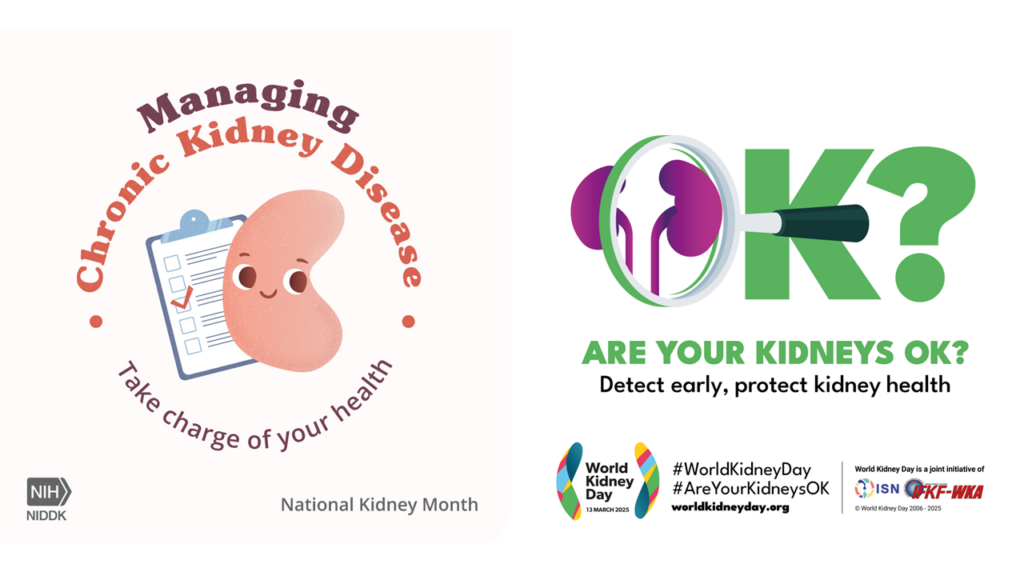Every March, communities across the country come together for National Kidney Month 2025 — a time dedicated to raising awareness about kidney disease and empowering individuals to take charge of their health.
Complementing this national focus is World Kidney Day 2025, celebrated on March 13, a global campaign with origins rooted in international efforts to elevate kidney health awareness and foster cross-border collaboration. The theme for World Kidney Day 2025 is “Are Your Kidneys OK? — Detect early, protect kidney health.”
While National Kidney Month drives domestic initiatives in research, prevention and patient care, World Kidney Day broadens this commitment by sharing success stories and innovative screening campaigns from around the world.
Kidney Research UK reminds everyone in their “Bladder to be Safe Than Sorry” campaign that proactive screening of bladder health is also essential, as it plays a critical role in overall urinary well-being and kidney function.
In tandem, the Urology Care Foundation launched its own campaign, titled “Don’t Kidney Yourself,” speaking to the value of early detection through routine kidney function tests and provides comprehensive resources to help people understand their risk factors.
With chronic kidney disease (CKD) affecting around 36 million Americans, National Kidney Month 2025 is a powerful reminder of the urgent need for early detection, lifestyle adjustments and cutting-edge treatment innovations.
Related: World Kidney Day and National Kidney Month 2024: New and Promising Treatments for Kidney Disease
A Growing Health Crisis
Kidney disease is a silent epidemic. According to the CDC, about one in seven adults in the US have CKD, and nearly 90% remain undiagnosed. Because kidneys can lose up to 90% of their function before symptoms emerge, many patients are diagnosed only after significant damage has occurred.
Minority communities, particularly Black and Hispanic Americans, face higher CKD prevalence due to limited access to preventive care, influenced by genetic factors, social determinants and systemic barriers.
Additionally, many individuals with risk factors such as high blood pressure or diabetes are not routinely tested for kidney function — underscoring the need for more comprehensive screening in primary care settings.
Moreover, for patients with kidney failure, a transplant remains the best option for extended survival; however, approximately 90,000 people are still on the transplant waiting list, driving the exploration of innovative solutions like bioengineered kidneys and xenotransplantation.
Beyond the personal toll, kidney disease imposes a massive economic burden. The US spends over $130 billion annually on CKD and related complications, with end-stage kidney disease (ESKD) making up nearly 7% of Medicare spending, even though it affects less than 1% of beneficiaries.
Scientific Breakthroughs and Ongoing Research
In recent years, a surge in clinical trials for kidney disease has brought innovative therapeutic options to the forefront.
Novo Nordisk’s Ozempic Approval for CKD
The FDA has expanded the approval of Ozempic (semaglutide), a GLP-1 receptor agonist, to help reduce kidney disease progression in adults with type 2 diabetes and CKD, marking the first GLP-1 treatment option for this vulnerable patient population. The approval spurred investor interest and market projections, with experts predicting rapid patient adoption.
Clinical trials demonstrated a 24% reduction in the risk of worsening kidney function and a 5% decrease in cardiovascular-related deaths among participants.
The company’s recent patient-centric ‘My Ozempic Era’ campaign, leveraged personal testimonials, educational content and interactive platforms to showcase how individuals are taking control of their health.
Biocity’s SC0062 for Diabetic Kidney Disease
In a promising Phase II clinical trial, Biocity’s SC0062, a selective endothelin type-A receptor antagonist, met its primary endpoint in patients with diabetic kidney disease (DKD). The study showed improvements in kidney function markers.
Roche’s Gazyva/Gazyvaro for Lupus Nephritis
Roche submitted a Biologics License Application (BLA) for Gazyva/Gazyvaro (obinutuzumab) in the treatment of lupus nephritis. The Phase III REGENCY study revealed that nearly half of the patients receiving Gazyva/Gazyvaro with standard therapy achieved complete renal response.
These innovations highlight a critical shift toward early intervention and patient-centered treatments. However, breakthroughs can only translate into better patient outcomes if they reach everyone in need.
Industry and Market Trends in Kidney Disease Treatment
The CKD market is expected to have strong growth driven by increasing disease prevalence, rising diabetes and hypertension rates and technological innovations such as wearable dialysis devices and digital health solutions.
Several biotech and pharmaceutical companies are at the forefront.
Maze Therapeutics is among the new biotech IPOs to launch this year, with two investigational CKD candidates in tow.
Reata Pharmaceuticals (now part of Biogen) secured FDA approval for Skyclarys (omaveloxolone) in 2023, targeting mitochondrial dysfunction in kidney disease.
Vertex Pharmaceuticals is advancing its program with inaxaplin (VX-147), an investigational candidate in Phase III, currently being evaluated for its potential to treat patients suffering from specific forms of kidney disease.
Outset Medical is expanding Tablo, a home dialysis system that offers greater flexibility and improved quality of life.
Regulus Therapeutics reported clinical Phase Ib updates for farabursen (RGLS8429), which indicated a reduction in kidney cyst growth in patients with autosomal dominant polycystic kidney disease (ADPKD).
Quite recently, Cadrenal Therapeutics partnered with Abbott to study tecarfarin in patients with HeartMate 3 left ventricular assist devices, aiming to improve anticoagulation and patient outcomes.
World Kidney Day 2025: A Worldwide View on Kidney Disease Research
The International Society of Nephrology (ISN) leads World Kidney Day 2025 initiatives, promoting research, education and cross-border collaboration. Their work reinforces that kidney health challenges are universal and demand coordinated action from healthcare professionals, policymakers and communities alike.
Across the globe, initiatives such as Nephroplus’s free kidney screening camps in South Asia are breaking down barriers to early diagnosis, while a feature in Sri Lanka’s Daily Mirror spotlights a life-changing renal transplant success story.
In addition, new European Union (EU) funding is being directed toward integrated CKD care models that emphasize early detection and coordinated treatment, including telemedicine solutions.
In global market analysis, the hemodialysis market is expected to surge from $104.87 billion in 2023 to $168.92 billion by 2030, while the artificial kidney market is poised to grow at compound annual growth rate (CAGR) of 13% by 2032, reflecting the potential of wearable and artificial kidney technologies, including patient-friendly, home-based renal therapies.
Integrating these global efforts with domestic initiatives deepens the commitment to transforming kidney care worldwide.
National Kidney Month 2025 and World Kidney Day 2025 emphasize the importance of regular screenings for those at risk, as well as adopting healthy lifestyle habits — like maintaining a balanced diet, exercising consistently and advocating for kidney health. The journey from awareness to action continues as healthcare professionals, researchers, industry leaders and the broader community actively work to transform kidney disease management.












Join or login to leave a comment
JOIN LOGIN